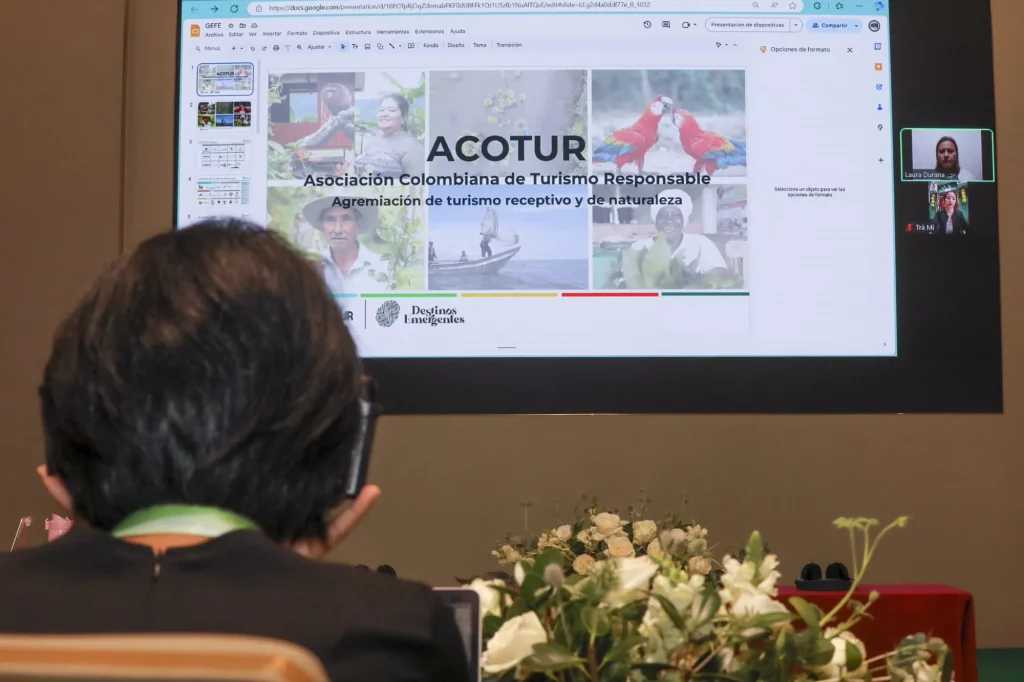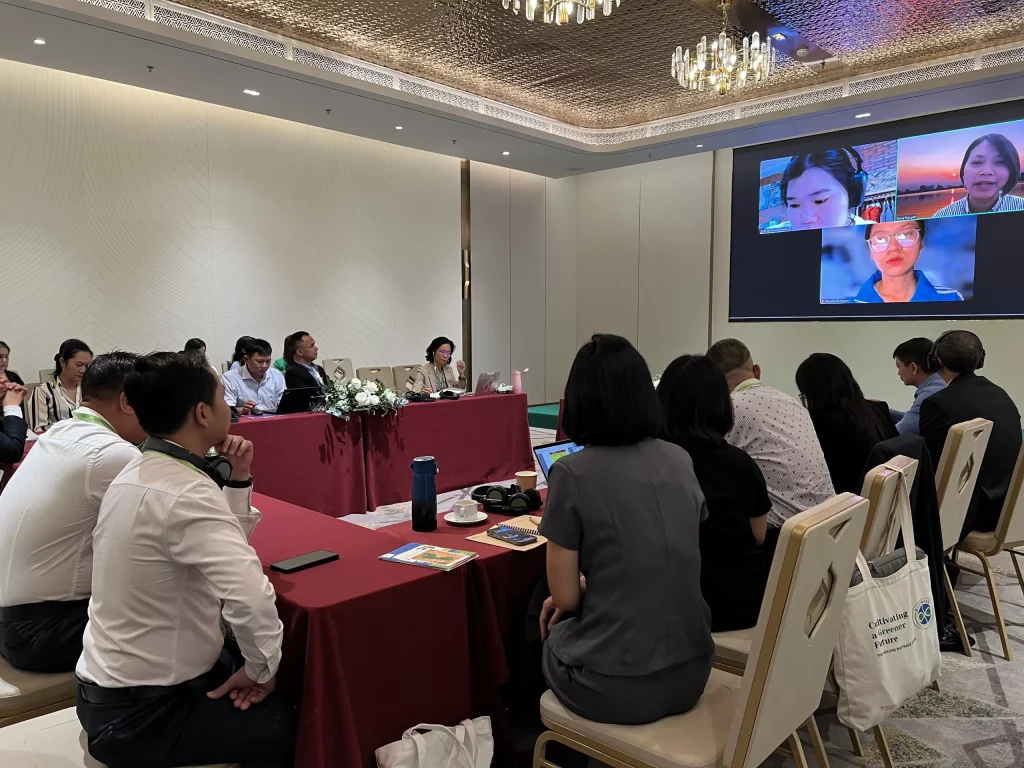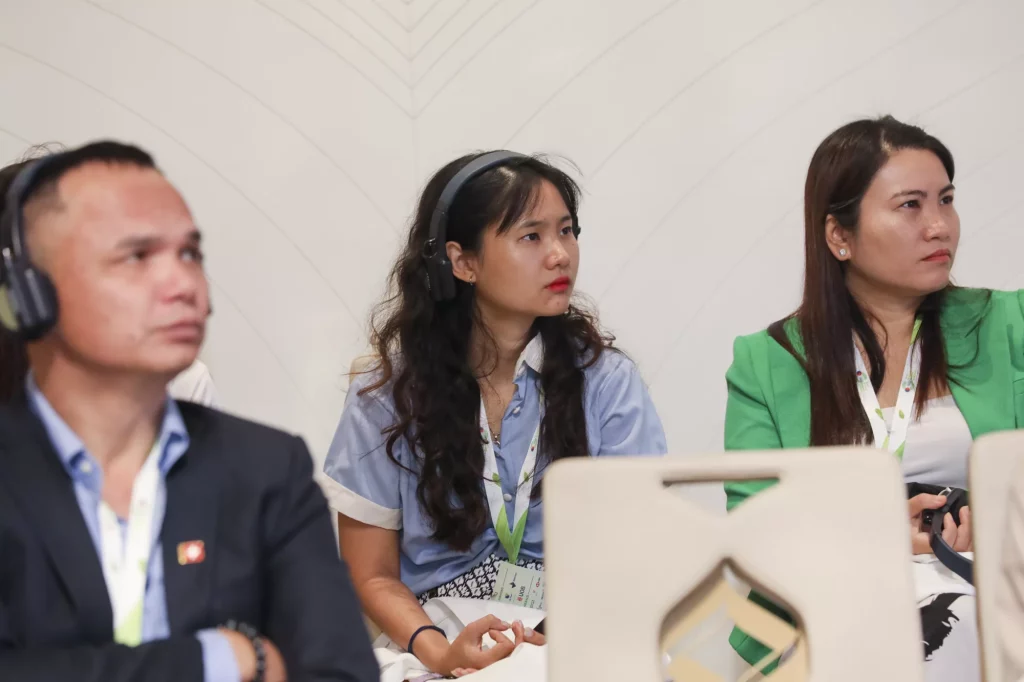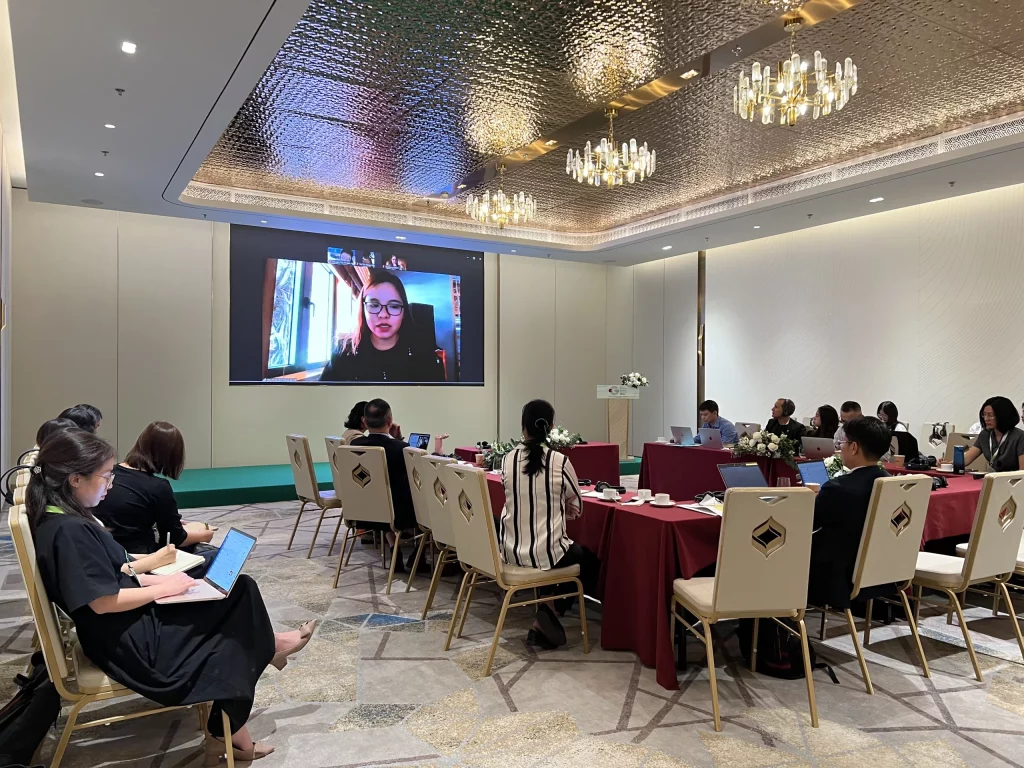HCM City – The ST4SD project, in collaboration with the Swiss Import Promotion Program (SIPPO), organised three seminars on promoting sustainable tourism and aiming for a zero-emission goal in the tourism industry within the framework of the Green Economy Forum and Exhibition (GEFE) on 23rd October 2024 in Ho Chi Minh City.
At the events, local and international experts shared experiences and perspectives on sustainable tourism certification in Colombia and Vietnam, the need for measuring greenhouse gas emissions, and innovative initiatives in agritourism within the food and beverage industry in Vietnam and Switzerland.
Sustainable tourism certification brings multiple benefits
At the first workshop, experts from Colombia shared about the benefits of sustainable tourism certificationsand their experience in developing, implementing, and monitoring certifications in this South American country. Meanwhile, experts from the ST4SD project and representatives from the Department of Culture, Sports, and Tourism of Quang Nam province provided updates on the province’s set of green tourism criteria.

According to Mrs. Mary Amalia Vásquez, SIPPO’s Regional Representative for Latin America, Colombia is the second most biodiverse country in the world and one of the 12 countries globally with policies on sustainable tourism. “In Colombia, we have national standards for the industry, destinations, and criteria for sustainable tourism. We have initiatives such as promoting nature tourism, scientific tourism, and education about theculture and environment. These are important factors for us to build future generations that are conscious of environmental protection, committed to biodiversity, and sustainable tourism,” said Mrs. Mary.
In Colombia, SIPPO supports the development of several sustainable tourism tools, including the Trade Promotion Academy, which provides destination promotion tools, a sustainable tourism guide with certifications from around the world, and training activities.
Federico Murrugarra, Project Manager of Competitiva project at Swisscontact in Colombia, also shared aboutactivities aimed at enhancing the competitiveness of the tourism industry and strengthening the value chain for sustainable tourism in Colombia. Mr. Federico explained that the program supports businesses in the supply chain to achieve carbon emission reduction targets within a certain timeframe. “We create a journey to sustainability, aligning criteria with the Global Sustainable Tourism Council for travel agencies and accommodation providers. Additionally, we support the establishment of destination management organizations,” he added.

Speaking at the workshop, Mrs. Laura Durana, National Director of the Colombian Responsible Tourism Association (AcoTour), explained that AcoTour’s goal is to develop sustainable tourism to increase international visitors to Colombia. AcoTour collaborates with local communities to create tours and sustainable tourism products, empowering them to leverage their traditional values while protecting the environment. Currently, about 80% of businesses focus on nature conservation, cultural exchange, and building ecosystems for sustainable tourism development. Nearly 50% of AcoTour members have received the TourCert certification.
In Vietnam, Quang Nam province is the first locality to issue a provincial set of green tourism criteria developed based on 25 international standards, which have been adapted to suit local conditions. As of August 2024, 25 tourism attractions and tourism businesses in the province have received the provincial green certification. Speaking at the event, Mr. Van Ba Son, Deputy Director of the Quang Nam provincial Department of Culture, Sports, and Tourism, said that the province was encouraging businesses and the community to develop tourism products and activities based on these criteria to ensure sustainability. “The criteria represent a commitment from both local authorities and businesses to practice green tourism, using the criteria as a guideline to create more sustainable tourism products and activities,” he emphasized.
Ms. Nguyen Thi Thu Trang, a consultant for the ST4SD project, is currently advising local authorities and the tourism community on updating the set of green tourism criteria for Quang Nam province, including the development of standards for restaurants and shopping facilities. According to Ms. Trang, there are several challenges in effectively implementing these criteria: the lack of supportive policies and mechanisms, leading to limited participation from local companies; a lack of awareness and understanding regarding tourism management and sustainable tourism operations; and a shortage of promotional activities and information-sharing about the benefits.
“This certification program brings many benefits and encourages enterprises and destinations to participate. These benefits include information-sharing, media exposure to increase recognition, and the opportunity to expand market share, especially as more tourists are concerned about sustainable destinations and eco-friendly products,” Ms. Trang said. “These criteria are useful tools and guides for businesses to assess and implement”.

Measuring to evaluate the effectiveness of carbon emission reduction in the tourism industry
According to a report by the World Travel and Tourism Council (WTTC), the tourism industry contributes 8.1% of global greenhouse gas emissions and is one of the largest emitting sectors worldwide. The growing demand for measuring emissions requires tourism management authorities, businesses, and the tourism community to be well-prepared.
Mrs. Nguyen Truyen, an energy auditing expert, explained that the value chain in the tourism sector is complex because it involves many different organizations, such as travel agencies, transport companies, hotels/resorts/guesthouses, and restaurants. Therefore, measuring greenhouse gas emissions presents a challenge due to the diverse, complicated, overlapping value chain, and the difficulty in clearly defining boundaries. Mrs. Truyen noted that through emissions inventories, the environmental impacts can be assessed, solutions for reducing greenhouse gases can be identified, and effectiveness can be evaluated, such as measuring CO2 emissions per guest per kilometer, CO2 emissions per guest per tour, or CO2emissions per room per night in a hotel. She suggested that there should be guidelines for stakeholders, especially small and medium-sized enterprises, providing feasible and cost-effective emission reduction solutions that are easy to implement.
Reducing carbon emissions is also linked to the construction industry. Mr. Laurent Corpataux, an expert from SIPPO, pointed out that when designing and constructing buildings, the focus is often on emissions during operation, but the carbon embedded in building materials should also be considered. Structural materials like walls and ceilings contain carbon, making up 11% of total emissions, and it takes 15 years to offset the carbon emissions from the construction of buildings. Many customers are more aware of sustainable building materials such as wood and bamboo; however, if these materials are used in construction, the wood and bamboo must come from sustainably-managed forests to ensure the building is truly sustainable. According to Mr. Laurent, restaurants and hotels that use technical wood save costs, manage quality well, and have faster construction processes because there is no need for additional decoration.

At the seminar, Mr. Vo Van Phong, Director of C2T Communications and Tourism Co., Ltd., introduced the “Green Passport” model in Ben Tre, where tourists have the tools to measure their carbon footprint from activities such as dining, sightseeing, and accommodation. Tourists can directly fill in their information and see which activities contribute the most emissions. Additionally, the company applies a circular economy model, reducing plastic waste by 80% by turning coconut shells into drinking cups and collecting coconut waste to make organic compost.
Increasing local value through agricultural tourism
The third seminar focused on sharing agricultural tourism models in the food and beverage sector in Vietnam and Switzerland. Mrs. Le Pham Thien Hang, founder of An Farm Hoi An (Hoi An city, Quang Nam province), established a small organic farm growing a variety of Asian and European herbs after realizing the harmful chemicals, pesticides, and preservatives found in the food, fruits, vegetables, and beverages people consume daily. Currently, An Farm Hoi An organizes agricultural tourism programs that combine herb-based tea-making workshops aimed at promoting better sleep and mental relaxation, as well as educational workshops for both children and adults about the value of herbs and organic gardening techniques.
An Farm Hoi An uses solar energy to dry herbs, and during processing, they do not use chemicals, including preservatives. Every year, the farm welcomes 3,000 – 5,000 children to experience farm life and learn how to prepare herbal teas, helping them reconnect with nature. Additionally, the farm offers 1-2 free organic nutrition workshops to encourage people to return to natural living.
“Agriculture depends on the environment and weather. We need to understand the soil, the plants, and be patient in understanding how the environment and climate change. We also need to accept the losses that come with farming,” Mrs. Hang said. Speaking about the challenges in developing agricultural tourism, she emphasized the high source of capital, a shortage of specialized labor in organic farming and herbs, and the community’s lack of awareness.

Silk Sense Hoi An River Resort, the first zero-plastic hotel in Hoi An (Quang Nam province), has adopted a sustainable development approach that is environmentally friendly and has received the “Travelife Gold for Accommodation Sustainability” certificate from Travelife, an international sustainability certification organization. According to Mrs. Ha Thi Dieu Vien, Executive Assistant Manager of Silk Sense Hoi An River Resort, sustainable development brings four key values: economic value, environmental protection, community support, and human resource development. Sustainable development contributes to fair and deserved income for workers. Environmental protection practices help reduce waste, use energy efficiently, promote cultural conservation, and spread local values to tourists. Additionally, the resort integrates sustainability into its training programs, helping employees practice green initiatives.
At the seminar, Mrs. Susanne Reber, Sustainable Tourism Lead at SIPPO Bern, introduced a unique tourism development model that combines accommodation, food, and agricultural businesses in Valposchiavo, a valley in southern Switzerland. The initiative focuses on collaboration between tourism and trade sectors, enhancing the local value chain, maintaining and creating job opportunities, increasing biodiversity by utilizing local materials, and reducing trade transportation.
They created the “100% Valposchiavo” brand, involving over 60 local businesses producing more than 150 products using only local materials. Currently, 95% of the agricultural land in the region produces organic certified products from Bio Suisse, the main organization of organic agriculture in Switzerland. The local tourism community offers unique experiences such as vineyard tours and wine production, as well as pasta-making classes.
“This is a small valley, so we must differentiate ourselves through quality, not quantity. Besides, stakeholders do not share the same level of awareness, so collaboration is needed to implement initiatives. Furthermore, standards and certifications must be streamlined to fit the local context,” said Mrs. Susanne.
The three seminars, featuring exchanges and shared experiences from Switzerland, Colombia, and Vietnam, provided valuable insights on the impact of tourism on the environment and the tourism sector’s transformation to reduce carbon emissions.